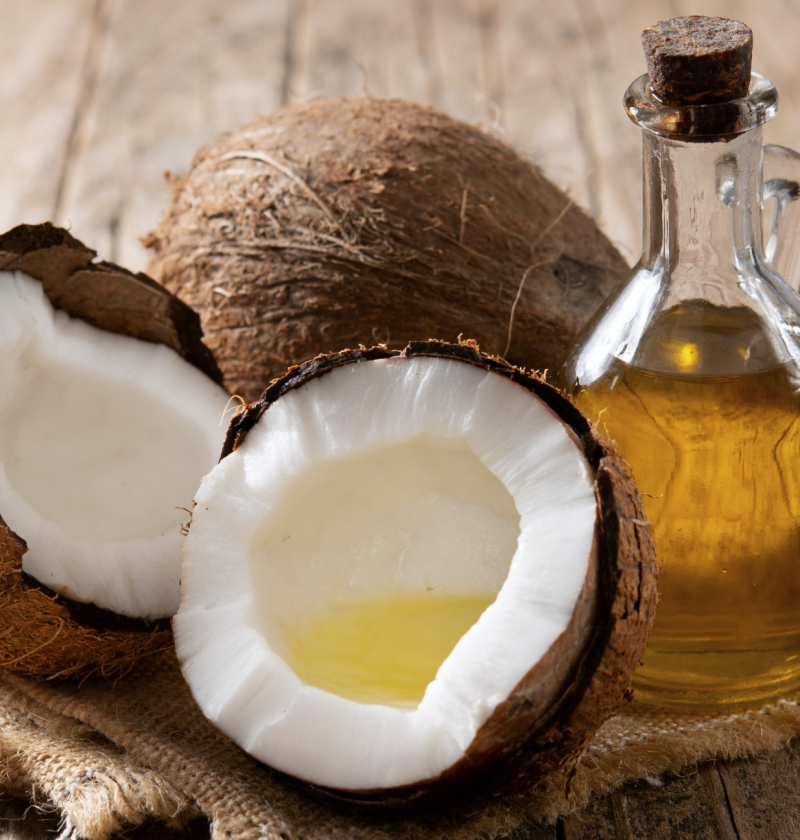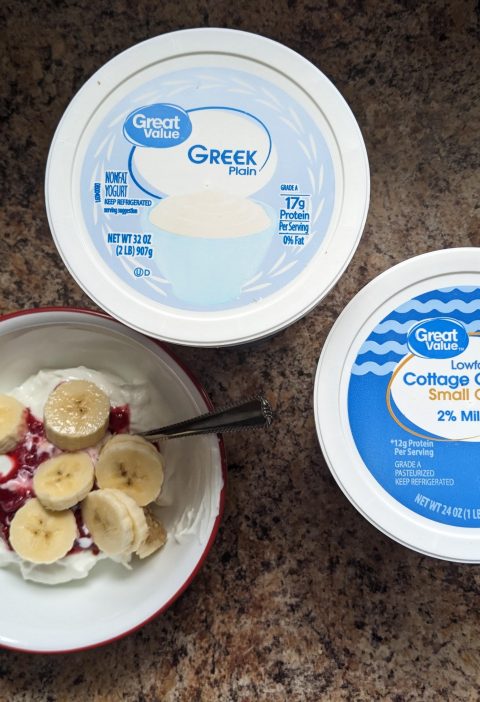In the vegan and dairy-free world, coconut oil is a common substitute for butter. And some tout coconut oil as a health food with benefits such as better skin, burning more fat, and improving symptoms of Alzheimer’s disease. On the other hand, coconut oil is high in saturated fat, which has been linked with increased “bad” cholesterol and heart disease.
So what’s the truth about coconut oil? Is it just another fad, or something healthy to include in your diet? Let’s take a look at coconut oil’s macronutrients, micronutrients, and other relevant studies to decide.
Macronutrients in Coconut Oil
When it comes to macronutrients, coconut oil is all fat. Fat is not a bad thing — our bodies need fat to function! In fact, eating enough healthy fats can help improve brain health, help with vitamin absorption, and manage cholesterol levels.
Saturated Fat & Medium-Chain Fatty Acids
Almost all of the fat found in coconut oil is saturated. (This depends on the specific type and brand you get, but it usually ranges from 12-13 grams of saturated fat out of 14 grams of fat total, which is over half the recommended dietary allowance.) Eating too much saturated fat is associated with weight gain, high cholesterol, and heart disease.
However, some research suggests that the type of saturated fat found in coconut oil — medium-chain fatty acids — may have some benefits. Studies show that MCFAs may help break down fat (fat oxidation) and improve insulin sensitivity. These fatty acids break down more easily than long-chain fatty acids (another type of saturated fat). This means they’re more likely to be used for energy rather than stored.
The benefits of MCFAs seem to be most relevant for people trying to manage metabolic disease. But many studies have found that coconut oil significantly raises cholesterol, including the “bad” cholesterol, LDL. So while MCFAs may be better than some forms of saturated fat, for the average person, the recommended saturated fat intake should take precedence over any benefits that may come from MCFAs.
Micronutrients in Coconut Oil
What about the micronutrient content – vitamins and minerals? Unfortunately, coconut oil has pretty much no vitamins or minerals. (If you look at the nutrition label, you’ll see numbers by the fats and then a bunch of big fat zeros.) Some forms of coconut oil (particularly virgin coconut oil) have beneficial antioxidants such as polyphenols. However, as many other healthier foods are high in antioxidants (think berries, vegetables, and nuts), don’t spoon up the coconut oil just to get your antioxidants. Coconut oil is high in calories and unhealthy fat, with little to no benefit of micronutrients.
Additional Coconut Oil Studies
What else do studies show about coconut oil? Unfortunately, as one study review points out, many coconut oil clinical studies performed with animals have not yet been replicated with humans. But the animal studies do reveal some interesting findings. One study found that virgin coconut oil may prevent liver damage. Another study found that virgin coconut oil may help by “lowering lipid levels in serum and tissue” (both risk factors for cardio-vascular disease and atherosclerosis).
One meta-analysis in 2019 sums up the research nicely: consuming coconut oil increases LDL cholesterol, and “the metabolism of lauric acid, the major fatty acid in coconut oil, remains unclear”.
Is Coconut Oil Healthy?
So what’s the verdict? Is coconut oil part of a healthy diet?
While some preliminary studies show potential benefits of coconut oil, it has been shown to increase bad cholesterol. It also has almost no vitamin or mineral content. Like most foods, coconut oil can be enjoyed as part of a healthy diet, but it should be used sparingly.
The truth about coconut oil:
– Coconut oil is all fat, mostly saturated
– lt has potential benefits from MCFAs (a type of saturated fat found in some coconut oil)
– Coconut oil contains little to no vitamins / minerals
– It may have other potential benefits that require further study
– Coconut oil should be enjoyed in moderation!
For additional information on coconut oil, check out this great article from the Harvard School of Public Health.
Want some healthier substitutes for coconut oil? Check our my article about how to modify recipes to make them healthier!






